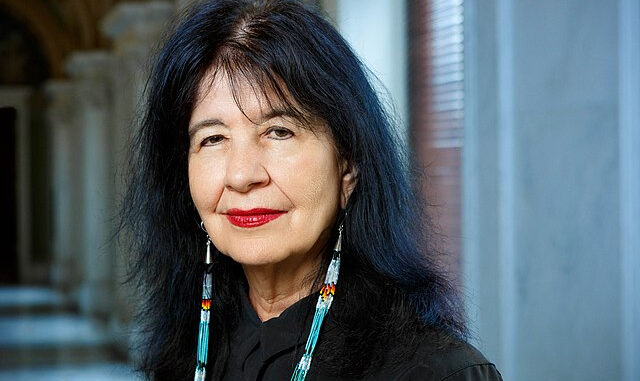
Emma Polen | News Editor
March 30, 2023
Joy Harjo, a celebrated poet, shared her work and life advice to a crowd of hundreds in the Carnegie Music Hall on Monday evening.
Harjo visited Pittsburgh this week as part of Pittsburgh Arts & Lectures’ Ten Evenings series hosting celebrated authors. Her evening talk centered specifically around her 2022 work, “Weaving Sundown in a Scarlet Light,” a collection of 50 poems to celebrate her then-50 years of writing poems.
Harjo made her published poetry debut in 1972, and since then she has gained various awards and titles, not least of which was 23rd U.S. Poet Laureate. She was the first Native American to hold the honor and only the second Poet Laureate Consultant in Poetry to serve in the position for three terms.
Her success did not come without difficulties, but “there would be no stories if there were not challenges,” Harjo said at the event.
Harjo has been part of the Muscogee (Creek) Nation since childhood, but she saw very little representation of Native Americans in poetry writing at an early age.
Growing up in Tulsa, Okla., Harjo said she loved poetry because of her mother and music because of her father. The rhythm and phrasing spoke to her from an early age, as did their oral storytelling capabilities.
Now, Harjo is recognized as a poet, musician, playwright and author who brings duality about the human and natural worlds into her work.
“How in the world,” Harjo asked during her lecture, “do you find a meeting place between…a system in which everything was given to a group of people and therefore…there’s a hierarchy, versus a place where…everyone – the animal, people – have a place?”
While there may not be a “meeting place,” Harjo said that she came to poetry because she wanted a “sacred language,” one that could express what was sometimes unspeakable, even impossible.
“They [poems] are carriers of essential, of meeting,” Harjo said, comparing poetry to a transmission station’s purpose.
After a bit of backstory about herself and her work, Harjo read four selections from various works she has published in the past 50 years. The first was a poem from her early writings, titled “Remember,” that Harjo said has since been used at funerals, weddings and even made its way onto the Lucy spacecraft.
“Remember” described memories carried on through both human and natural life. The poem called for readers to talk to the life around them, but also to listen.
The first reading played well with the following talk Harjo gave about her writing process.
The author needs quiet to write, she said, in order to listen for a work to come to her.
“I just take in sometimes even just the feel of it, and then I write the form,” Harjo said. “I’m convinced [“Remember”] was given to me because I needed it.”
“Remember” was followed by an excerpt from Harjo’s “A Map to the Next World” book. A unique device in the work, which Harjo read to the audience, was “saxophone licks” of words between forms of poetry divided up in the collection, almost like a band of musicians warming up between sets.
Then, Harjo read one of her most beloved poems, titled, “Perhaps the World Ends Here.”
The poem, while it is an ode to the kitchen table, takes the reader over years of memories shared around, above and below an ordinary kitchen table.
“Perhaps the world will end at the kitchen table, while we are laughing and crying, eating of the last / sweet bite,” the poem finishes.
The timeless nature of the table’s story strikes at something Harjo believes is a major element of poems. Like consciousness, poetry writing can be in many places at once, she said.
Harjo completed her lecture with a reading from one of her prose pieces, “Dreams.” The work discussed dreams as a sort of memoir of memories, bringing hope for future generations but also lessons from the past.
Duquesne students from the English department had the opportunity to visit Harjo’s lecture.
“It was really nice to hear her talk about creative cycles…allowing yourself to have bad moments in writing,” said Kaitlyn Nicholson, senior English major.
Harjo’s lecture was the Pittsburgh Arts & Lectures’ biggest event since bringing the in-person option back after the pandemic, said Stephanie Flom, the executive director of Pittsburgh Arts & Lectures.
“It was really great to hear she didn’t set out to do poetry,” said Jayda Benson, senior English major. “It was something that found her…Inspiration doesn’t strike magically.”

